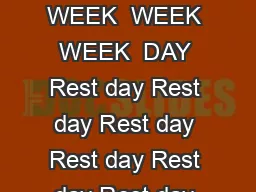PPT-Day RS#31 Think back to yesterday. What is our goal as historians in this
Author : calandra-battersby | Published Date : 2018-10-31
History L ab To learn the different perspectives of people living in the Revolutionary War era in order to answer our overarching question Should the colonies
Presentation Embed Code
Download Presentation
Download Presentation The PPT/PDF document "Day RS#31 Think back to yesterday. Wha..." is the property of its rightful owner. Permission is granted to download and print the materials on this website for personal, non-commercial use only, and to display it on your personal computer provided you do not modify the materials and that you retain all copyright notices contained in the materials. By downloading content from our website, you accept the terms of this agreement.
Day RS#31 Think back to yesterday. What is our goal as historians in this: Transcript
Download Rules Of Document
"Day RS#31 Think back to yesterday. What is our goal as historians in this"The content belongs to its owner. You may download and print it for personal use, without modification, and keep all copyright notices. By downloading, you agree to these terms.
Related Documents














